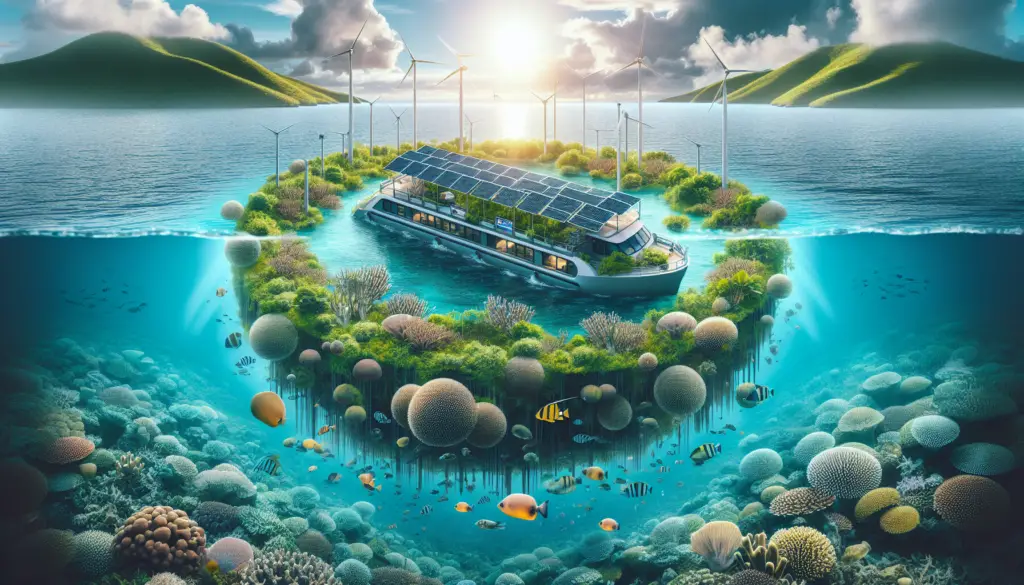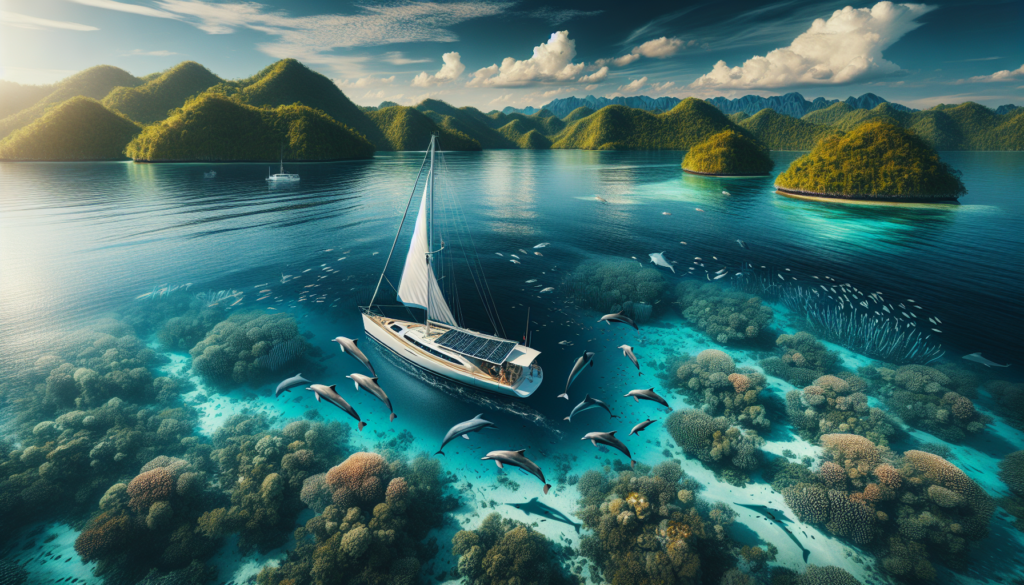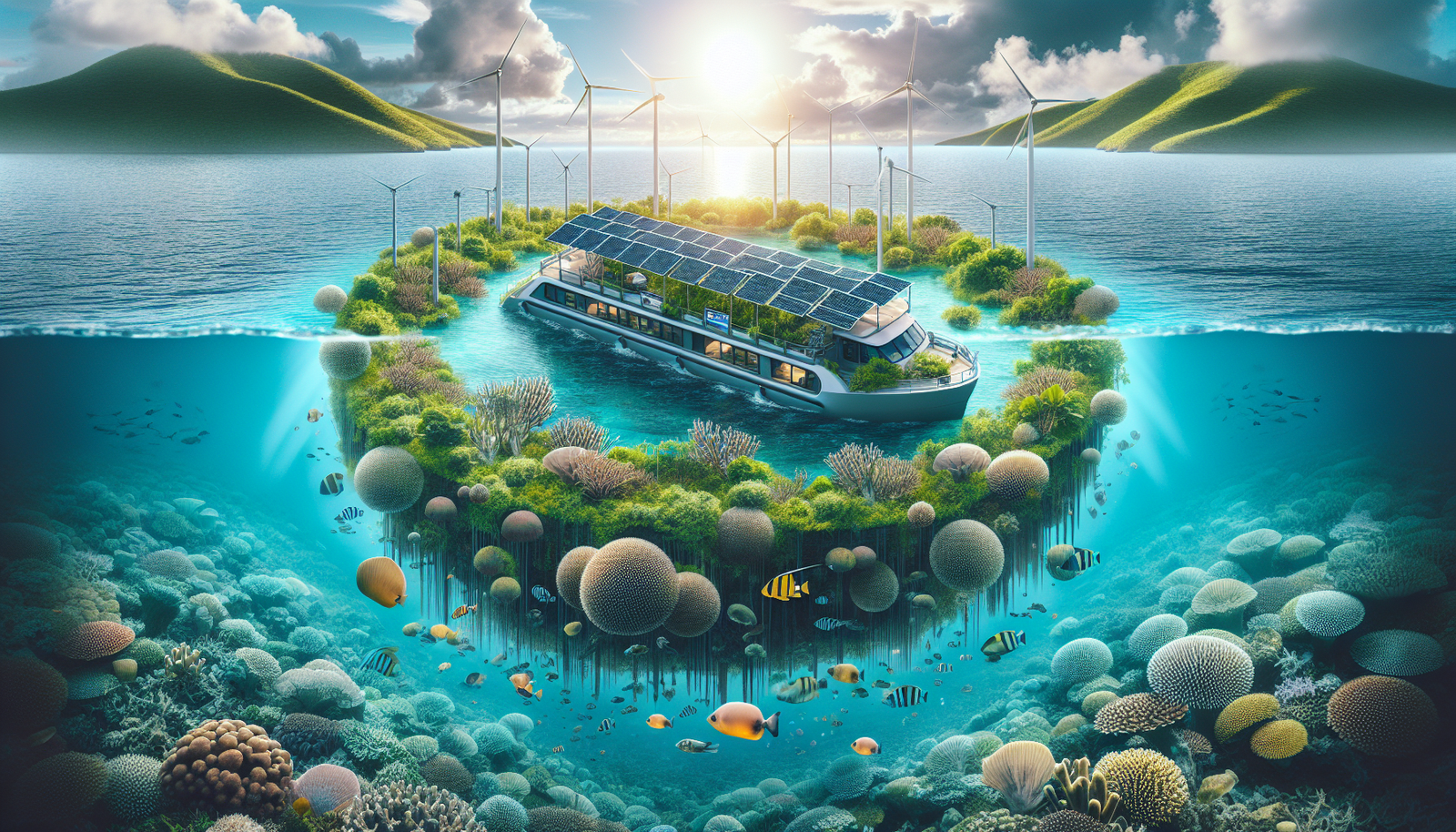Picture this: you’re gliding across the ocean, basking in the tranquility of the open water as sea life flutters about below. Suddenly, your ideal getaway is marred by the realization that your carbon footprint is becoming a deep-seated scar on the natural world. No need to hang up your captain’s hat quite yet though, as “Eco-Friendly Boating Solutions for Navigating Sensitive Areas” shines a light on how you can continue your aquatic adventures while preserving the environment. This article uncovers green boating practices which ease the burden on our planet, without diminishing your enjoyable encounters with the high seas. It points towards solutions that not only reduce water pollution, but also protect sensitive marine areas. In your journey to become a more conscientious navigator, this text will surely be an essential tool.

Understanding Sensitive Boating Areas
When you go boating, you often come across some breathtakingly beautiful sights of the sea and the coastline. However, certain areas are more sensitive to boating activities than others.
Identifying Sensitive Boating Environments
Sensitive boating environments can be marshlands, coral reefs, seagrass beds, or anywhere that is populated by marine life. When you’re in these areas, you need to take extra care not to disrupt the natural balance.
Environmental Impact of Traditional Boating
Traditional boating, with its engine noise, wave action, and pollutants, can have a detrimental impact on these sensitive boating environments. Motorboats create waves that erode shorelines and disrupt underwater habitats. They also emit pollutants that can be harmful to marine life.
Regulation and Guidelines for Sensitive Boating Areas
Most areas now enforce strict regulations to protect sensitive boating environments. They may involve speed limits, boating lanes, and timing restrictions. It is crucial that you respect these guidelines for the survival of these fragile marine ecosystems.
Technological Innovations in Eco-Friendly Boating
Fortunately, the boating industry is seeing massive strides in technological innovations, with a focus on environmentally friendly alternatives.
Use of Solar Powered Boats
Solar-powered boats are emerging as a viable alternative to traditional gas-guzzling motorboats. They use solar panels to charge a battery and power a silent, pollution-free engine.
Innovations in Electric Boats
Electric boats are another promising innovation. They not only operate silently, causing zero disturbance to marine life but also emit no harmful pollutants or greenhouse gases.
Biofuels Use in Boating
Biofuels, derived from organic waste or crops, are another promising development. They burn cleaner than regular fuel and are a renewable resource, reducing our dependency on fossil fuels.

Engine Alternatives for Eco-Friendly Boating
Choosing the right engine for your boat can make a big difference in its eco-friendliness.
Hybrid Boat Engines
Hybrid boat engines combine a conventional engine with an electric motor, providing efficiency and reducing emissions. It uses the motor at low speeds and the engine at higher speeds, conserving fuel.
Electric Boat Engines
Indeed, electric boat engines are a substantial leap forward. They generate no emissions and run almost silently. While they may have limitations in terms of power and range, improvements are being made rapidly.
Biofuel Boat Engines
Biofuel engines, using biofuels derived from crops like corn, soybeans, or waste, help lower greenhouse gas emissions and are biodegradable, making them a greener option.
Understanding Eco-Friendly Hull Design
The design of a boat, particularly its hull, plays a significant role in its environmental impact.
Advantages of Eco-Friendly Hull Designs
Eco-friendly hull designs are more hydrodynamic, reducing engine power needed to move the boat and consequently reducing fuel use and emissions.
Materials Used in Eco-Friendly Hull Design
These designs often utilize lightweight but sturdy materials like aluminum or fiber-reinforced polymers, often repurposed from recycled sources.
Emerging Innovations in Eco-Friendly Hull Design
Emerging innovations include hulls with air cavities, which reduce water friction and improve fuel efficiency.

Sustainable Fishing Practices on Boats
Fishing, while a popular boating activity, can have a severe environmental impact if not done sustainability.
Reducing Bycatch with Eco-Friendly Tools
Bycatch, the unintentional capture of non-target species, can be reduced with the use of eco-friendly tools such as circle hooks and turtle excluder devices.
Sustainable Fishing Gear
Sustainable fishing gear, like hook and line or pole and line, are selective in what they catch and have little impact on habitats.
Monitoring Systems for Sustainable Fishing
Technologies like vessel monitoring systems (VMS) ensure boats are only fishing in designated areas.
Waste Management on Boats
Managing waste effectively on board is essential to reduce pollution and maintain the cleanliness of the waters where we boat.
Importance of Waste Management on Boats
Bad waste management can lead to litter and pollution in the waters, harming the environment and marine life.
Green Solutions for Waste Management
Green solutions include using biodegradable products, recycling, composting, and proper disposal of hazardous waste.
Recycling on Boats
Many marinas now offer recycling facilities. Everything from glass bottles to fishing line can be recycled.

Eco-Friendly Boating Behaviours
The behaviour and habits of boaters can significantly impact the environment.
Avoiding Underwater Noise Pollution
Boats create a lot of noise underwater, which can be incredibly disruptive to aquatic life. Eco-friendly behaviours include limiting engine noise and avoiding sensitive areas.
Fuel-Efficient Boating Practices
Practising fuel-efficient boating, like maintaining an optimum speed, can significantly reduce the amount of fuel used and emissions produced.
Antifouling Practices
Using eco-friendly antifouling paints to prevent growth on a boat’s hull, which can bring invasive species into new environments, is another way to help the environment.
Education and Training in Eco-Friendly Boating
Awareness and education are key to promoting eco-friendly boating behaviours.
Eco-Friendly Boating Courses
Many institutions now offer courses that highlight the importance of protecting marine environments and how to do so while enjoying the boating activity.
Certifications for Eco-Friendly Boating
Obtaining a certification for eco-friendly boating can be a great way to showcase one’s commitment to conservation and responsible behaviour.
Awareness Campaigns on Eco-Friendly Boating Practices
Awareness campaigns, such as those promoted by NGOs or governmental agencies, play a crucial role in informing and educating the public about eco-friendly boating.
Incentives for Eco-Friendly Boating
Incentives can be a powerful tool in encouraging boaters to adopt environmentally friendly behaviours.
Government Interventions and Policies
Governments around the world are offering incentives like tax breaks, subsidies for eco-friendly boats and gear, and access to preferential boating areas.
Community-Led Initiatives
Local communities often lead initiatives, such as marina recycling programs or clean boating pledges.
Benefits of Eco-Friendly Boating
Eco-friendly boating benefits not only the environment but also the boaters themselves through fuel savings and a richer, more diverse marine environment to enjoy.
Case Studies
Looking at successful eco-friendly boating initiatives can provide valuable insights and lessons.
Successful Implementation of Eco-Friendly Boating Practices
Case studies of successful eco-boating initiatives demonstrate that with commitment and effort, significant change can occur.
Campaigns and Programs Promoting Eco-Friendly Boating
Campaigns and programs around the world, such as those run by national parks or maritime conservation organizations, serve as excellent examples of what can be achieved.
Challenges and Solutions in Eco-Friendly Boating Implementation
Though there are many challenges to implementing eco-friendly boating practices, innovative solutions continue to emerge, offering hope for a more sustainable and responsible boating future.
In conclusion, eco-friendly boating practices and technologies are essential for preserving sensitive marine environments. By harnessing emerging innovations and promoting responsible behaviours, we can seek to minimize human impact while still enjoying the recreational activity of boating. So as you hit the waves next time, keep these pointers in mind, and remember, you play a vital role in maintaining these breathtaking views that you enjoy on your boating trips.


[…] stop at land; it extends to the heart of the waters you navigate too. Your article, “eco-friendly boating Practices In Shallow Water Environments,” prepares you to steer your boat with eco-friendly […]